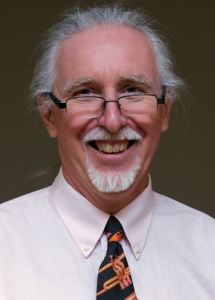 By Bob Hulteen
By Bob Hulteen
When no one else was really coming into the office in the first months of the pandemic (as per guidelines), I decided to grow my beard out. I mean, I’ve had a goatee for more than a decade. But goatees require some shaving daily, and that’s hardly been worth it during COVID times. Since no meetings were being held in the office, I decided I could wear unmatched socks, pants with holes in the knees, and a big ole’ beard.
Masks became a bit of a problem. You wash your beard and put on a mask: Boom, sitting at your desk, your chin hairs stick straight out – a Mohawk under your lips.

My office — it’s not as bad as it looks
My office space itself also started getting a little sloppy. With no one else at the office, I started to roll tables from the conference room into my office and use tables instead of file folders. I had my info-for-the-enews pile, my crisis-communications pile, my payday-lending pile, my ecofaith pile, my Uprising pile, my narrative-budget pile, and so on.
“Goatees require some shaving daily, and that’s hardly been worth it during COVID times.”
As colleagues stopped by the building to pick up mail, their hearts sunk as they peered through the window to my office.
Now with relaxed restrictions regarding vaccinated people being indoors together, synod staff members are spending some more time in the office (while still not hosting broader meetings). I’m back to a goatee, so I have less issues with unruly whiskers. Since we need the tables for group meetings, I’m putting memos and reports back into folders. Civilization is returning to the sixth floor of the Minnesota Church Center (specifically, my 12’ by 12’ nook).
BUT, I AM ALSO aware that the pandemic has uprooted more than just my work space and facial hair. Learning how to “share” the synod office with colleagues again is requiring some intentionality, … and I’m an extreme extravert.
In some ways it feels like we’ve all just been on vacation and are just coming back to work. In others, I feel like it’s a whole new workplace.
I know myself enough to know that this period of transition is also a time to be gentle – with myself and with my colleagues. Certainly anxieties have built up over the last 14 months; I don’t want to unleash my fears and hurts and worries on my coworkers. And, I will if I am not intentional.
I think similar feelings are likely true in many of our congregations as well. As we return to in-person worship over the next few months – whether outdoor or indoor, whether with singing or without – we all have opinions about when that should have happened (or when it should happen in the future, instead of now). Our disappointments over funerals unattended or youth trips untaken could manifest themselves in acts of dissent or passive aggressiveness (a real problem in the dominant culture of Minnesota, ya’ know). We could be very ungracious to each other.
“Our disappointments over funerals unattended or youth trips untaken could manifest themselves in acts of dissent or passive aggressiveness.”
I’ve seen some rostered leaders take some pretty hard hits over the last few months. Parishioners who do love to worship with their friends and families have challenged the leadership of the congregation – those people tasked with developing the plan to re-engage in public worship – in sometimes hurtful ways. Pastors have sometimes shown their irritation with increasing demands to develop skills that were not imagined in their seminary education.
As we return to in-person worship, we have a chance to live out the grace that has been given to us, that we have experienced from a loving God. We have the opportunity to extend to our leaders, our neighbors, our friends, our families an incarnated love that is unconditional. We can apologize; we can make amends; we can live differently. Intentionally.
We can be the church – embodied and free to serve.
And, if necessary, we can even apologize for actions like taking all the tables out of the conference room for our own personal use. (But, I’m not apologizing for the beard.)
